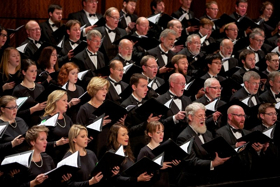Grand Rapids Symphony Chorus and Soloists Join Orchestra for Mozart's 'Great' Mass in C minor

Wolfgang Amadeus Mozart, composer of symphonies, operas and concertos, was one of the most gifted musicians in the history of Western classical music. In the 35 years of his life, Mozart gave the world over 600 masterworks. But Mozart's music is not beloved just for its sheer quantity, but also for its unparalleled quality.
Music Director Marcelo Lehninger will lead the Grand Rapids Symphony in a performance of one of Mozart's masterpieces, the Great Mass in C minor, along with Franz Schubert's "Unfinished" Symphony No. 8, and Charles Ives' The Unanswered Question, at 8 p.m. Friday and Saturday, November 16 and 17 in DeVos Performance Hall.
Joining the Symphony for the Richard and Helen DeVos Classical series concert is the Grand Rapids Symphony Chorus, directed by Pearl Shangkuan, plus soprano Martha Guth, mezzo-soprano Susan Platts, tenor Jonathan Matthew Myers, and bass-baritone Dashon Burton as guest soloists. Guest Artist sponsor is the Edith I. Blodgett Guest Artist Fund. Concert sponsor is Vibration Research.
Pope Francis, head of the worldwide Roman Catholic Church, in 2013 in the first major, wide-ranging interview of his papacy, declares his admiration for the music of Mozart, especially his Great Mass in C minor.
"Among musicians, I love Mozart, of course," he said. "The Et incarnates est from his Mass in C minor is matchless; it lifts you to God!"
In his great modern-day biography of Mozart, Maynard Solomon says that "occasionally . . . Mozart composed a work in a spirit of inquiry, as an affirmation of his beliefs, or as a gift of love or friendship. The several accounts of its origin indicate that the Mass in C Minor arose from a fusion of all three of these motivations."
Rather than for any financial incentive, Mozart began composing his Mass in C minor in his early 20s for a reason that was rather unusual for the composer - to fulfill a vow he had made to his wife, Constanze.
Albert Einstein once said that Mozart's music "is of such purity and beauty that one feels he merely found it - that it has always existed as part of the inner beauty of the universe waiting to be revealed."
Mozart's Great Mass, however, is only partially revealed.
When the time came to premiere it, the work was incomplete. Mozart had to use movements from his earlier compositions to fill the missing pieces. Much to the frustration of musicians, audiences and scholars, Mozart never completed the Mass.
Despite its absent parts, the Mass in C minor contains some of Mozart's most astounding work. The soprano aria 'Et incarnates est' is especially difficult and was written specifically for the voice of Mozart's wife, Constanze, who performed the aria at the Mass's premiere.
Joining the Grand Rapids Symphony to sing this famous aria is soprano Martha Guth. Guth has performed distinctive roles in productions across the globe such as Mozart's The Marriage of Figaro and Don Giovanni at Opera Lyra Ottawa, and The Magic Flute and Il Seraglio in Göggingen, Germany.
Also joining the Grand Rapids Symphony are the exceptional voices of Susan Platts, John Matthew Myers and Dashon Burton. Both Platts and Myers have performed with the Grand Rapids Symphony previously in Beethoven's Symphony No. 9 in May 2018. Susan Platts also appeared with the Symphony in April 2012 for Mahler's Symphony No. 8 "Symphony of a Thousand."
The Grand Rapids Symphony Chorus, an ensemble of some 140 singers led by director Pearl Shangkuan and sponsored by Mary Tuuk, will help bring to life this classical masterpiece. Organized in 1962, the Grand Rapids Symphony Chorus attracts singers, ages 18 to 80, from all walks of life.
Last year, the chorus-in-residence traveled with the orchestra to New York City in April to sing Heitor Villa-Lobos' Chôros No. 10, It Tears Your Heart in Carnegie Hall. The chorus will join the Grand Rapids Symphony again in December for the Wolverine Worldwide Holiday Pops.
Preceding the Great Mass in the program are two pieces that complete the "unfinished" theme: Ives' The Unanswered Question and Schubert's Symphony No. 8.
Franz Schubert, like Mozart, wrote a lot of music in his lifetime. By the time he was 18, Schubert had composed two symphonies, two masses, five operas, and numerous piano and chamber pieces.
It comes as no surprise that locked away in a chest was two movements of what was meant to be a complete four-movement symphony. Now known as Schubert's "Unfinished" Symphony, the work is one of his most famous compositions.
Ives wrote The Unanswered Question while in his 20s. Though the work itself is complete, Ives used his music to contemplate the mysteries of life, the questions that cannot be answered.
Though Mozart and Schubert never completed their masterpieces, and Ives' questions will remain unanswered, the elegance and beauty of their music will continue to captivate audiences for ages to come.
Comments
.png)
|
.png)
|
Videos

